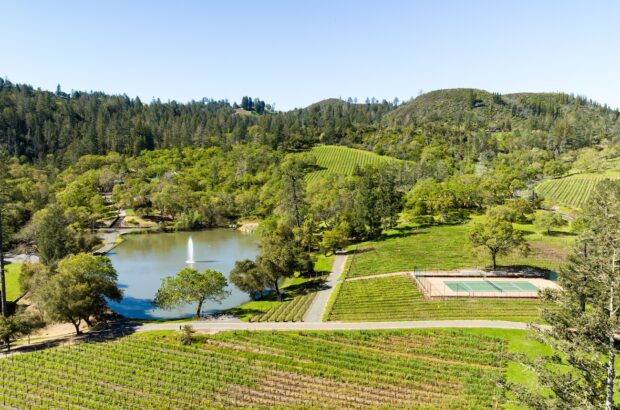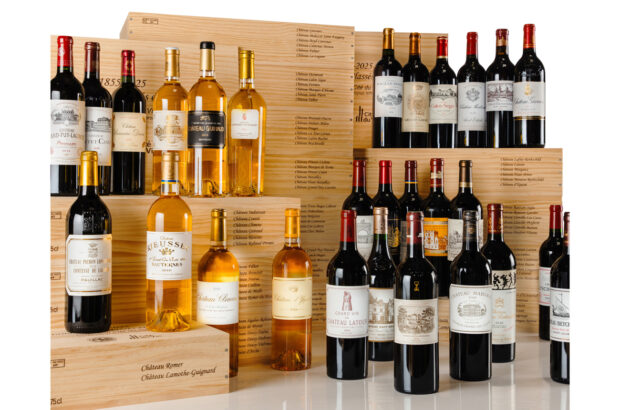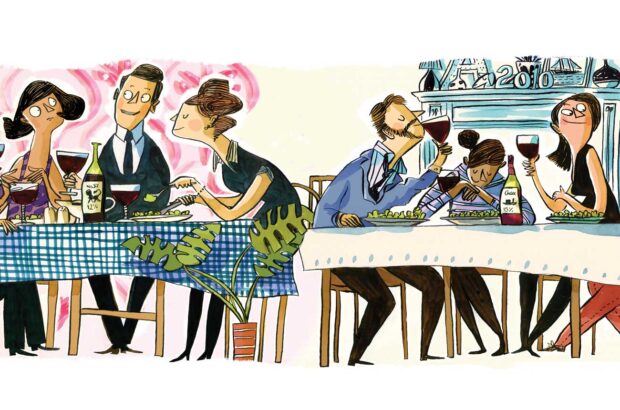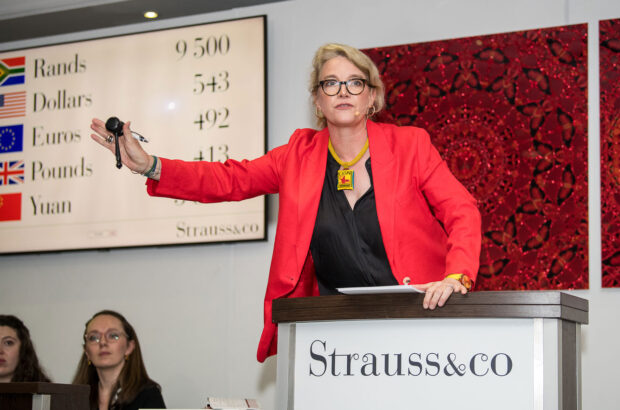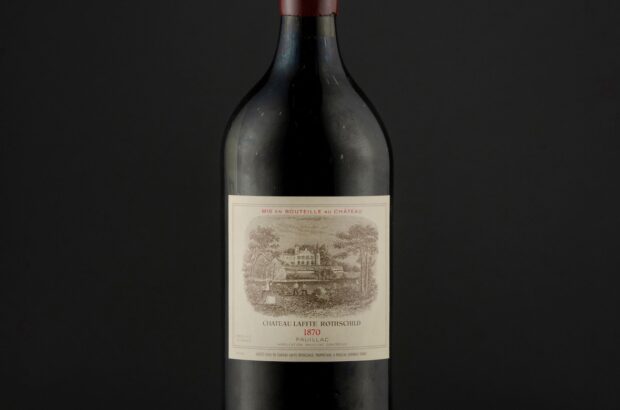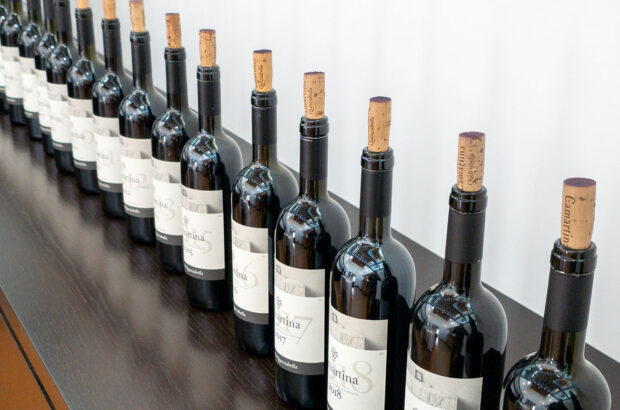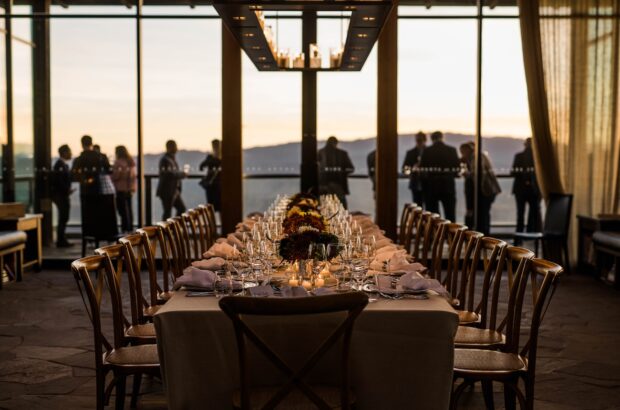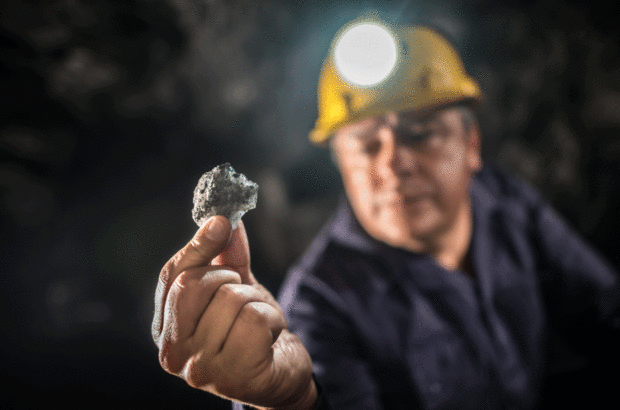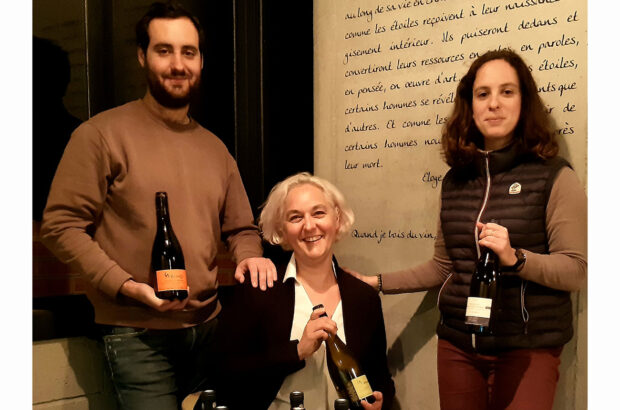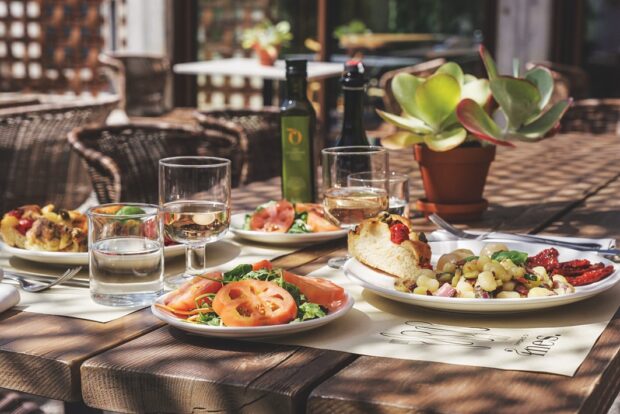Tasting is both simple and highly complex. A child can do it (I’m not talking about wine, obviously), and yet it’s a vast subject whose intricacies could fill many books.
So how do you go about getting the most out of your wine glass? I’ve talked to some of the world’s best tasters to discuss the tactics that they use when assessing, or just enjoying, a wine.
Wine tasting
Professional athletes are keenly aware of what affects their form. Wine tasters – especially those on the buying and writing side of the fence – are more likely to promote the myth of the infallible palate (theirs, naturally). Happily, that conversation is now changing as we learn more about our olfactory and taste systems.
‘The wine taster’s instrument is not only the nose but the entire body,’ says Ann-Sophie Barwich, a cognitive scientist, empirical philosopher and the author of Smellosophy: What the Nose Tells the Mind (£28.95, Harvard University Press, 2020). ‘The expert nose measures the volatiles in the wine, while their sensation is an expression also of the constitution of the taster. Mood, expectations, fatigue… all of that mediates the qualitative experience of a wine.’
What can we do about our physical and emotional inconsistencies and the impact they have on the tasting experience? Be aware of it, for a start. Work to minimise variations rather than ignoring them, and exploit the times when we’re on peak form.
Most wine tasters say they perform best in the morning. Jacques Polge, head perfumer at Chanel from 1978 to 2015, told me he found the same and deliberately assigned ‘important’ smell tasks to the first part of the day.
{"content":"PHA+RmVlbGluZyBodW5ncnk\/IEdvb2QsIHlvdXIgbm9zZSB3aWxsIHBlcmZvcm0gYmV0dGVyLiDigJhQcm9jZXNzaW5nIGluIHRoZSBvbGZhY3RvcnkgcGF0aHdheSBpcyBoZWF2aWx5IGRlcGVuZGVudCBvbiB3aGV0aGVyIHdlIGFyZSBodW5ncnkgb3IgZnVsbCzigJkgd3JpdGVzIG5ldXJvc2NpZW50aXN0IEdvcmRvbiBTaGVwaGVyZCBpbiA8ZW0+TmV1cm9nYXN0cm9ub215OiBIb3cgdGhlIEJyYWluIENyZWF0ZXMgRmxhdm9yIGFuZCBXaHkgaXQgTWF0dGVyczwvZW0+ICg8YSBocmVmPSJodHRwczovL2N1cC5jb2x1bWJpYS5lZHUvIiB0YXJnZXQ9Il9ibGFuayIgcmVsPSJub29wZW5lciBub3JlZmVycmVyIj5Db2x1bWJpYSBVbml2ZXJzaXR5IFByZXNzPC9hPiwgMjAxMikuPC9wPgo8cD5Bbm90aGVyIHJlYXNvbiB0byBiZXdhcmUgb2YgbHVuY2ggaXMgdGhhdCByZWNlbnRseSBlYXRlbiBmb29kIGNhbiBpbnRlcmZlcmUgd2l0aCB0aGUgcGVyY2VwdGlvbiBvZiB0YXN0ZSwgb2Ygc3dlZXRuZXNzLCBiaXR0ZXJuZXNzLCBhc3RyaW5nZW5jeSBhbmQgYWNpZGl0eSBpbiBhIHdpbmUuIE5ldXRyYWwgKG5vdCBzYWx0eSkgY3JhY2tlcnMgYW5kIGRyeSBicmVhZCBhcmUgYmVzdCBpZiB5b3UgbmVlZCB0YXN0aW5nIHNuYWNrcy4gQXZvaWQgZWF0aW5nIGFueXRoaW5nIHN3ZWV0IGZvciBhdCBsZWFzdCBvbmUgaG91ciBiZWZvcmUgYSB0YXN0aW5nLCBiZWNhdXNlIHN1Z2FyIGNhbiBjcmFzaCB5b3VyIHBhbGF0ZSBjb21wbGV0ZWx5IGFuZCBpdCB0YWtlcyBhIHdoaWxlIHRvIHJlY292ZXIgKEnigJl2ZSBuZXZlciBmb3VuZCBhIHNhdGlzZmFjdG9yeSBleHBsYW5hdGlvbiBmb3IgdGhpcyBwaGVub21lbm9uIOKAkyBkbyBnZXQgaW4gdG91Y2ggaWYgeW91IGNhbiBzaGVkIGFueSBsaWdodCkuPC9wPgo8ZGl2IGNsYXNzPSJhZC1jb250YWluZXIgYWQtY29udGFpbmVyLS1tb2JpbGUiPjxkaXYgaWQ9InBvc3QtaW5saW5lLTMiIGNsYXNzPSJpcGMtYWR2ZXJ0Ij48L2Rpdj48L2Rpdj4KPHA+QWxzbzog4oCYQmUgd2FyeSBvZiB0b290aHBhc3RlLCBlc3BlY2lhbGx5IG1pbnR5IG9uZXMsIGFzIHRoZXkgY2FuIHJ1aW4gdGhlIHRhc3RlIG9mIHdpbmUgaWYgdXNlZCBxdWl0ZSBzb29uIGJlZm9yZWhhbmQs4oCZIGFkdmlzZXMgSmFuY2lzIFJvYmluc29uIE1XLjwvcD4KPGRpdiBjbGFzcz0iYnJlYWtvdXQgcGFsZXR0ZS1hIHBhbmVsIHBhbmVsLWRlZmF1bHQiPjxkaXYgY2xhc3M9InBhbmVsLWJvZHkiPjxkaXYgY2xhc3M9J2JyZWFrb3V0LWNvbnRlbnQnPjwvcD4KPGRpdiBjbGFzcz0iYWQtY29udGFpbmVyIGFkLWNvbnRhaW5lci0tbW9iaWxlIj4KPGRpdiBpZD0icG9zdC1pbmxpbmUtNCIgY2xhc3M9ImlwYy1hZHZlcnQiPjwvZGl2Pgo8L2Rpdj4KPGgzPjxzdHJvbmc+SG93IGJpZyBpcyBhIHNpcD88L3N0cm9uZz48L2gzPgo8cCBzdHlsZT0idGV4dC1hbGlnbjogbGVmdCI+4oCYSGVyZeKAmXMgYSB2YXJpYWJsZSB0aGF04oCZcyByYXJlbHkgZGlzY3Vzc2VkLOKAmSBzYXlzIEFsZXggSHVudCBNVyBvZiBCZXJrbWFubiBXaW5lIENlbGxhcnMuIOKAmEV2ZXJ5b25lIHdpbGwgaGF2ZSBhIGRpZmZlcmVudCBzd2VldCBzcG90LCBidXQgaXTigJlzIHdvcnRoIGV4cGVyaW1lbnRpbmcgdW50aWwgeW91IGZpbmQgdGhlIHNpcCBzaXplIHRoYXQgZ2l2ZXMgeW91IHRoZSBtb3N0IHZpdmlkIGltcHJlc3Npb24gb2YgdGhlIHdpbmUuPC9wPgo8cCBzdHlsZT0idGV4dC1hbGlnbjogbGVmdCI+4oCYSXQgc2hvdWxkbuKAmXQgYmUgc28gbXVjaCB0aGF0IHRoZXJl4oCZcyBubyByb29tIHRvIG1vdmUgdGhlIHdpbmUgYXJvdW5kIHlvdXIgbW91dGggb3IgYnViYmxlIGEgYml0IG9mIGFpciB0aHJvdWdoIGl0IOKAkyBidXQgaXTigJlzIGltcG9ydGFudCB0byBoYXZlIGVub3VnaCBbaW4gdGhlIG1vdXRoXSB0aGF0IHRoZSBhcm9tYXMgcmVhY2ggdGhlIGJhY2sgb2YgdGhlIG5vc2UsIGFuZCBhbHNvIHRvIGdldCBhIHNlbnNlIG9mIHRoZSB3aW5l4oCZcyBwaHlzaWNhbCBwcmVzZW5jZS7igJk8L3A+CjwvZGl2PjxkaXYgY2xhc3M9J2JyZWFrb3V0LWJ1dHRvbnMnPjxkaXYgY2xhc3M9J3Jvdyc+PC9kaXY+PC9kaXY+PC9kaXY+PC9kaXY+CjxkaXYgY2xhc3M9ImFkLWNvbnRhaW5lciBhZC1jb250YWluZXItLW1vYmlsZSI+PGRpdiBpZD0icG9zdC1pbmxpbmUtNSIgY2xhc3M9ImlwYy1hZHZlcnQiPjwvZGl2PjwvZGl2Pgo8aDM+PHN0cm9uZz5TdGFydCB3aXRoIGEgZ29vZCBnbGFzczwvc3Ryb25nPjwvaDM+CjxwPuKAmFdoaWxlIHRoZXJl4oCZcyBhIGxvdCBvZiBtYXJrZXRpbmcgaHlwZSBhYm91dCBzdGVtd2FyZSwganVzdCBvbmUgd2VsbC1tYWRlLCBkZWNlbnQtc2l6ZWQgZ2xhc3Mgd2lsbCBkbyzigJkgc2F5cyBBdXN0cmFsaWFuIHdpbmUgam91cm5hbGlzdCBhbmQgY29tcGV0aXRpb24ganVkZ2UgSmFuZSBGYXVsa25lci4g4oCYSXQgaGFzIHRvIGFsbG93IHRoZSBhcm9tYXRpY3MgdG8gZG8gdGhlaXIgdGhpbmcgYW5kIGhlbHAgdGhlIHdpbmUgb3BlbiB1cC4gQmFzaWNhbGx5LCB5b3VyIG5vc2UgaGFzIHRvIGZpdCBpbnRvIGl0LiBJdCBpcyBjb21wbGV0ZWx5IHVubmVjZXNzYXJ5IHRvIGhhdmUgZ2xhc3NlcyBtYXRjaGVkIHRvIHBhcnRpY3VsYXIgd2luZXMgb3Igc3R5bGVzLiBXaG8gaGFzIHJvb20gZm9yIHRoYXQ\/IEkgc3RhbmRhcmRpc2UgbXkgcHJvZmVzc2lvbmFsIHRhc3RpbmdzIHdpdGggdGhlIFJpZWRlbCBPdXZlcnR1cmUgTWFnbnVtLuKAmTwvcD4KPHA+4oCYU2hhcGUsIHNpemUgYW5kIHRoaWNrbmVzcyBvZiBnbGFzcyByZWFsbHkgY2FuIG1ha2UgYW4gYW1hemluZyBkaWZmZXJlbmNlIHRvIGhvdyBhIHdpbmUgdGFzdGVzIOKAkyBlc3BlY2lhbGx5IHRvIHRoZSBhcm9tYXMs4oCZIHNheXMgUm9iaW5zb24sIHdobywg4oCYbmVlZGxlc3MgdG8gc2F54oCZLCBpcyBrZWVuIG9uIGhlciBvd24sIG1hZGUgaW4gY29sbGFib3JhdGlvbiB3aXRoIGRlc2lnbmVyIFJpY2hhcmQgQnJlbmRvbi4gQ2hhbXBhZ25lIHNob3VsZCBiZSB0YXN0ZWQgaW4gYSBub3JtYWwgd2luZSBnbGFzcyBvciBib3dlZCAod2lkZSkgZmx1dGUsIG5ldmVyIGEgdGFsbCwgbmFycm93IGZsdXRlLjwvcD4KPGgzPjxzdHJvbmc+TWFrZSB0aGUgZmlyc3Qgc25pZmYgY291bnQ8L3N0cm9uZz48L2gzPgo8cD5BY2NvcmRpbmcgdG8gU3RldmVuIFNwdXJyaWVyLCBEZWNhbnRlcuKAmXMgZm9ybWVyIGNvbnN1bHRhbnQgZWRpdG9yOiDigJhNaWNoYWVsIEJyb2FkYmVudOKAmXMgZmxvdyBvZiB0YXN0aW5nIHN0aWxsIHJ1bGVzOiBjb2xvdXIsIG5vc2UsIHBhbGF0ZSwgYWZ0ZXJ0YXN0ZSBhbmQgc3BpdC7igJkgKFNhZGx5LCBTdGV2ZW4gU3B1cnJpZXIgcGFzc2VkIGF3YXkgaW4gTWFyY2ggMjAyMTsgc2VlIDxhIGhyZWY9Imh0dHBzOi8vd3d3LmRlY2FudGVyLmNvbS93aW5lLW5ld3Mvb3Bpbmlvbi9yZW1lbWJlcmluZy1zdGV2ZW4tc3B1cnJpZXItdHJpYnV0ZS00NTQ4NzMvIj5EZWNhbnRlciYjODIxNztzIHRyaWJ1dGU8L2E+Lik8L3A+CjxwPlRoZSBjbHVlcyBvZmZlcmVkIGJ5IGNvbG91ciBhcmUgb2YgcGFydGljdWxhciBpbnRlcmVzdCB0byB0aG9zZSBibGluZCB0YXN0aW5nLCBidXQgdGhleeKAmXJlIGltcG9ydGFudCB0byBub3JtYWwgZHJpbmtlcnMsIHRvby4gV2UgZHJpbmsgd2l0aCBvdXIgZXllczogd2hhdCB3ZSBzZWUgd2lsbCBpbmZsdWVuY2UgZmxhdm91ciBwZXJjZXB0aW9uLjwvcD4KPHA+SG93ZXZlciwgZm9yIGFueW9uZSwgdGhlIGZpcnN0IHNuaWZmIGlzIGtleS48L3A+CjxwPkFtZXJpY2FuIGVkdWNhdG9yIGFuZCBmb3VuZGVyIG9mIHRoZSBXaW5kb3dzIG9uIHRoZSBXb3JsZCBXaW5lIFNjaG9vbCwgS2V2aW4gWnJhbHksIHNheXMgbWFueSBvZiBoaXMgcHVwaWxzIHRyeSB0byB0YXN0ZSB0aGUgd2luZSBiZWZvcmUgc21lbGxpbmcgaXQuIOKAmEkgc2F5LCDigJxTdG9wLiBXYWl0LiBEb27igJl0IGV2ZW4gdGhpbmsgb2YgdHJ5aW5nIHRoaXMgd2luZS4gV2UgYXJlIGdvaW5nIHRvIHNwZW5kIHRocmVlIG1pbnV0ZXMgW3NtZWxsaW5nXS4gSSB3YW5uYSBoZWFyIHlvdSBzbWVsbCB0aGUgd2luZS7igJ0gVGhlbiBJIGhhdmUgdGhlbSBwdXQgdGhlaXIgaGFuZCBvbiB0b3Agb2YgdGhlIGdsYXNzIGFuZCBzd2lybCBpdCwgd2hpY2ggaW50ZW5zaWZpZXMgdGhlIGFyb21hcyBbd2hlbiB5b3UgcmVtb3ZlIHlvdXIgaGFuZCBhbmQgc21lbGxdLiBJIHNheSwg4oCcTG9vaywgSeKAmW0gbm90IGEgbWFnaWNpYW4sIGRpZCB5b3UganVzdCBzZWUgd2hhdCBoYXBwZW5lZCBoZXJlP+KAneKAmTwvcD4KPHA+SWYgeW91IGhhdmUgZXZlciBhdHRlbmRlZCBvbmUgb2YgdGhlIGxlZ2VuZGFyeSBibGluZC10YXN0aW5nIHNlbWluYXJzIHJ1biBieSBSb25hbiBTYXlidXJuIE1TLCBoZWFkIG9mIHdpbmUgYXQgTG9uZG9uIHByaXZhdGUgbWVtYmVyc+KAmSBjbHViIDY3IFBhbGwgTWFsbCwgeW91IGNvdWxkIGJlIGZvcmdpdmVuIGZvciB3b25kZXJpbmcgaWYgeW914oCZcmUgZXZlciBnb2luZyB0byB0YXN0ZSB0aGUgd2luZSBhdCBhbGwsIHN1Y2ggaXMgdGhlIGRldGFpbCB3aXRoIHdoaWNoIGhlIGVuY291cmFnZXMgaGlzIHN0dWRlbnRzIHRvIHBhcnNlIGNvbG91ciBhbmQgYXJvbWEuPC9wPgo8cD5UaGUgZmlyc3Qgc25pZmYgaXMgdGhlIGRlZXBlc3Qg4oCTIG9yIGF0IGxlYXN0IHRoZSBtb3N0IGltcG9ydGFudCwgYXMgQ2F0IFN0ZXZlbnMgZGlkbuKAmXQgc2luZy4gTmFzYWwgYWRhcHRhdGlvbiBtZWFucyB0aGF0IHlvdXIgbm9zZSBxdWlja2x5IGFjY2xpbWF0aXNlcyB0byBzbWVsbHMuIEVhY2ggZnVydGhlciBzbmlmZiBzZWVtcyBwcm9ncmVzc2l2ZWx5IGxlc3MgaW50ZW5zZS4gSWYgeW91IG5vdGljZSB0aGF0IHlvdeKAmXJlIHN1ZmZlcmluZyBmcm9tIG5vc2UgZmF0aWd1ZSwgcmVzZXQgYnkgc21lbGxpbmcgeW91cnNlbGY6IGJ1cnkgeW91ciBub3NlIGluIHRoZSBjcm9vayBvZiB5b3VyIGFybS48L3A+CjxkaXYgaWQ9ImF0dGFjaG1lbnRfNDU1NzMwIiBzdHlsZT0id2lkdGg6IDg3MHB4IiBjbGFzcz0id3AtY2FwdGlvbiBhbGlnbmNlbnRlciI+PGltZyBmZXRjaHByaW9yaXR5PSJoaWdoIiBkZWNvZGluZz0iYXN5bmMiIGFyaWEtZGVzY3JpYmVkYnk9ImNhcHRpb24tYXR0YWNobWVudC00NTU3MzAiIGNsYXNzPSJsYXp5bG9hZCBibHVyLXVwIHNpemUtZnVsbCB3cC1pbWFnZS00NTU3MzAiIGRhdGEtcHJvY2Vzc2VkIHNyYz0iaHR0cHM6Ly93d3cuZGVjYW50ZXIuY29tL3dwLWNvbnRlbnQvdGhlbWVzL3NpbWJhLXRoZW1lL2Fzc2V0cy9pbWFnZXMvcGxhY2Vob2xkZXIucG5nIiBkYXRhLXNyYz0iaHR0cHM6Ly9rZXlhc3NldHMudGltZWluY3VrLm5ldC9pbnNwaXJld3AvbGl2ZS93cC1jb250ZW50L3VwbG9hZHMvc2l0ZXMvMzQvMjAyMS8wMy9NaWNoYWVsLUJyb2FkYmVudC5qcGciIGFsdD0iTWljaGFlbCBCcm9hZGJlbnQiIHdpZHRoPSI4NjAiIGhlaWdodD0iODYwIiBkYXRhLXNpemVzPSJhdXRvIiBkYXRhLXNyY3NldD0iaHR0cHM6Ly9rZXlhc3NldHMudGltZWluY3VrLm5ldC9pbnNwaXJld3AvbGl2ZS93cC1jb250ZW50L3VwbG9hZHMvc2l0ZXMvMzQvMjAyMS8wMy9NaWNoYWVsLUJyb2FkYmVudC5qcGcgODYwdywgaHR0cHM6Ly9rZXlhc3NldHMudGltZWluY3VrLm5ldC9pbnNwaXJld3AvbGl2ZS93cC1jb250ZW50L3VwbG9hZHMvc2l0ZXMvMzQvMjAyMS8wMy9NaWNoYWVsLUJyb2FkYmVudC0zMDB4MzAwLmpwZyAzMDB3LCBodHRwczovL2tleWFzc2V0cy50aW1laW5jdWsubmV0L2luc3BpcmV3cC9saXZlL3dwLWNvbnRlbnQvdXBsb2Fkcy9zaXRlcy8zNC8yMDIxLzAzL01pY2hhZWwtQnJvYWRiZW50LTYzMHg2MzAuanBnIDYzMHcsIGh0dHBzOi8va2V5YXNzZXRzLnRpbWVpbmN1ay5uZXQvaW5zcGlyZXdwL2xpdmUvd3AtY29udGVudC91cGxvYWRzL3NpdGVzLzM0LzIwMjEvMDMvTWljaGFlbC1Ccm9hZGJlbnQtMTM1eDEzNS5qcGcgMTM1dywgaHR0cHM6Ly9rZXlhc3NldHMudGltZWluY3VrLm5ldC9pbnNwaXJld3AvbGl2ZS93cC1jb250ZW50L3VwbG9hZHMvc2l0ZXMvMzQvMjAyMS8wMy9NaWNoYWVsLUJyb2FkYmVudC0zMjB4MzIwLmpwZyAzMjB3LCBodHRwczovL2tleWFzc2V0cy50aW1laW5jdWsubmV0L2luc3BpcmV3cC9saXZlL3dwLWNvbnRlbnQvdXBsb2Fkcy9zaXRlcy8zNC8yMDIxLzAzL01pY2hhZWwtQnJvYWRiZW50LTYyMHg2MjAuanBnIDYyMHcsIGh0dHBzOi8va2V5YXNzZXRzLnRpbWVpbmN1ay5uZXQvaW5zcGlyZXdwL2xpdmUvd3AtY29udGVudC91cGxvYWRzL3NpdGVzLzM0LzIwMjEvMDMvTWljaGFlbC1Ccm9hZGJlbnQtNTUweDU1MC5qcGcgNTUwdywgaHR0cHM6Ly9rZXlhc3NldHMudGltZWluY3VrLm5ldC9pbnNwaXJld3AvbGl2ZS93cC1jb250ZW50L3VwbG9hZHMvc2l0ZXMvMzQvMjAyMS8wMy9NaWNoYWVsLUJyb2FkYmVudC00NzB4NDcwLmpwZyA0NzB3IiBzaXplcz0iKG1heC13aWR0aDogODYwcHgpIDEwMHZ3LCA4NjBweCIgLz48cCBpZD0iY2FwdGlvbi1hdHRhY2htZW50LTQ1NTczMCIgY2xhc3M9IndwLWNhcHRpb24tdGV4dCI+VGhlIGxhdGUgTWljaGFlbCBCcm9hZGJlbnQgTVcuIENyZWRpdDogQ2hyaXN0aWUmIzgyMTc7czwvcD48L2Rpdj4KPGgzPjxzdHJvbmc+VGhlIGFwcHJvYWNoOiBoZWRvbmlzdGljIHZzIGludGVsbGVjdHVhbDwvc3Ryb25nPjwvaDM+CjxwPkl04oCZcyBvbiB0YXN0aW5nIOKAkyBhcyBvcHBvc2VkIHRvIHNtZWxsaW5nIOKAkyB0aGF0IHRoZXJl4oCZcyBtb3N0IGRpdmVyZ2VuY2UgYmV0d2VlbiB0aGUgZW1vdGlvbmFsIGFuZCBpbnRlbGxlY3R1YWwgc2Nob29scy4gVGhhdCBpcywgYmV0d2VlbiB0aGUgZ2VzdGFsdCBhcHByb2FjaCBvZiBsb29raW5nIGF0IHRoZSB3aG9sZSBhbmQgbm90aW5nIGl0cyBlZmZlY3Qgb24geW91ciBzZW5zZXMg4oCTIGFuZCB0aGUgYW5hbHl0aWNhbCByaWdvdXIgb2YgdGhlIHN5c3RlbWF0aWMgYXBwcm9hY2ggdGF1Z2h0IHRvIHByb2Zlc3Npb25hbCB0YXN0ZXJzLCB3aGljaCBjb25zaWRlcnMgYWNpZGl0eSwgdGFubmluLCBib2R5LCBhbGNvaG9sLCBsZW5ndGgsIGZsYXZvdXIsIHdpbmVtYWtpbmcgaW5mbHVlbmNlLCBkaWZmZXJlbmNlIGJldHdlZW4gdGhlIG5vc2UgYW5kIHRoZSBwYWxhdGUsIHZpc2Nvc2l0eSwgcHJpbWFyeSBhbmQgdGVydGlhcnkgYXJvbWFzJiM4MjMwOyBhbmQgc28gb24uPC9wPgo8cD7igJhCZWluZyBhbmFseXRpY2FsIGZpcnN0IGFuZCB0aGVuIGFsbG93aW5nIHRoZSBlbW90aW9uYWwgYnJhaW4gdG8ga2ljayBpbiB3aWxsIGdpdmUgeW91IHRoZSBiZXN0IHRhc3RpbmcgZXhwZXJpZW5jZSzigJkgZXhwbGFpbnMgU3RldmUgU21pdGggTVcsIGNvLW93bmVyIG9mIFB5cmFtaWQgVmFsbGV5IFZpbmV5YXJkcyBpbiBOZXcgWmVhbGFuZC48L3A+CjxwPlNheWJ1cm4gbm90ZXMgdGhhdCBldmVuIHdpdGhpbiB0aGUgZGlzY2lwbGluZSBvZiBibGluZCB0YXN0aW5nIHRoZXJlIGlzIGEgcGxhY2UgZm9yIGVtb3Rpb24uIOKAmEl04oCZcyBub3QgYSB2ZXJ5IHNjaWVudGlmaWMgd2F5IHRvIGJsaW5kIHRhc3RlIGJ1dCDigJMgZG8geW91IGxpa2UgaXQ\/IElmIHlvdSBnYXZlIG1lIGEgZ2xhc3Mgb2YgR2VybWFuIFJpZXNsaW5nIHRvIHRhc3RlIEnigJlkIGJlLCDigJxJdOKAmXMgbG92ZWx5LCBJIGxpa2UgdGhhdOKAnS4gSWYgeW91IGdhdmUgbWUgYW4gSXRhbGlhbiBQaW5vdCBHcmlnaW8sIEkgb2Z0ZW4gd291bGRu4oCZdCBbbGlrZSBpdF0sIHNvIEkgd291bGRu4oCZdCBiZSBwdXR0aW5nIHRoYXQgZG93biBhcyBhIFJoZWluZ2F1IFJpZXNsaW5nLuKAmTwvcD4KPGgzPjxzdHJvbmc+S25vdyB5b3VyIHBhbGF0ZTwvc3Ryb25nPjwvaDM+CjxwPuKAmEtub3dpbmcgeW91ciB3ZWFrbmVzc2VzIGlzIGNydWNpYWwgdG8gdW5kZXJzdGFuZGluZyB5b3VyIHBhbGF0ZSBhbmQgZWxpbWluYXRpbmcgYmlhc2VzIGFjY3VyYXRlbHks4oCZIHNheXMgY3JpdGljLCBjb25zdWx0YW50IGFuZCBlZHVjYXRvciBKZWFubmllIENobyBMZWUgTVcuIOKAmEFyZSB5b3UgbGVzcyBzZW5zaXRpdmUgdG8gdGFubmlucz8gRG8geW91IGVuam95IGhpZ2ggYWNpZGl0eT8gRG8geW91IG9mdGVuIG1pc3Mgd2luZSBmYXVsdHMgbGlrZSBicmV0dGFub215Y2VzIG9yIFRDQT8gRGlzY292ZXJpbmcgeW91ciBzdHJlbmd0aHMgYW5kIHdlYWtuZXNzZXMgYXMgYSB0YXN0ZXIgd2lsbCBlbmFibGUgeW91IHRvIGtub3cgd2h5IGNlcnRhaW4gd2luZSBzdHlsZXMsIHZhcmlldGllcyBvciBwcm9kdWNlcnMgYXBwZWFsIHRvIHlvdSBvciB0dXJuIHlvdSBvZmYuIFlvdeKAmWxsIHVuZGVyc3RhbmQgeW91ciBwYWxhdGUgcHJlZmVyZW5jZXMgbXVjaCBmYXN0ZXIgYW5kIG1vcmUgZWFzaWx5LCBhbmQgdGhlIHdpbmVzIHlvdSBncmF2aXRhdGUgdG93YXJkcyB3aWxsIG1ha2Ugc2Vuc2Uu4oCZPC9wPgo8ZGl2IGlkPSJhdHRhY2htZW50XzQ1NTY3MiIgc3R5bGU9IndpZHRoOiAxMzEwcHgiIGNsYXNzPSJ3cC1jYXB0aW9uIGFsaWdubm9uZSI+PGltZyBkZWNvZGluZz0iYXN5bmMiIGFyaWEtZGVzY3JpYmVkYnk9ImNhcHRpb24tYXR0YWNobWVudC00NTU2NzIiIGNsYXNzPSJsYXp5bG9hZCBibHVyLXVwIHNpemUtZnVsbCB3cC1pbWFnZS00NTU2NzIiIGRhdGEtcHJvY2Vzc2VkIHNyYz0iaHR0cHM6Ly93d3cuZGVjYW50ZXIuY29tL3dwLWNvbnRlbnQvdGhlbWVzL3NpbWJhLXRoZW1lL2Fzc2V0cy9pbWFnZXMvcGxhY2Vob2xkZXIucG5nIiBkYXRhLXNyYz0iaHR0cHM6Ly9rZXlhc3NldHMudGltZWluY3VrLm5ldC9pbnNwaXJld3AvbGl2ZS93cC1jb250ZW50L3VwbG9hZHMvc2l0ZXMvMzQvMjAyMS8wMy9KZWFubmllLUNoby1MZWUuanBnIiBhbHQ9IkplYW5uaWUgQ2hvIExlZSIgd2lkdGg9IjEzMDAiIGhlaWdodD0iODYwIiBkYXRhLXNpemVzPSJhdXRvIiBkYXRhLXNyY3NldD0iaHR0cHM6Ly9rZXlhc3NldHMudGltZWluY3VrLm5ldC9pbnNwaXJld3AvbGl2ZS93cC1jb250ZW50L3VwbG9hZHMvc2l0ZXMvMzQvMjAyMS8wMy9KZWFubmllLUNoby1MZWUuanBnIDEzMDB3LCBodHRwczovL2tleWFzc2V0cy50aW1laW5jdWsubmV0L2luc3BpcmV3cC9saXZlL3dwLWNvbnRlbnQvdXBsb2Fkcy9zaXRlcy8zNC8yMDIxLzAzL0plYW5uaWUtQ2hvLUxlZS0zMDB4MTk4LmpwZyAzMDB3LCBodHRwczovL2tleWFzc2V0cy50aW1laW5jdWsubmV0L2luc3BpcmV3cC9saXZlL3dwLWNvbnRlbnQvdXBsb2Fkcy9zaXRlcy8zNC8yMDIxLzAzL0plYW5uaWUtQ2hvLUxlZS02MzB4NDE3LmpwZyA2MzB3LCBodHRwczovL2tleWFzc2V0cy50aW1laW5jdWsubmV0L2luc3BpcmV3cC9saXZlL3dwLWNvbnRlbnQvdXBsb2Fkcy9zaXRlcy8zNC8yMDIxLzAzL0plYW5uaWUtQ2hvLUxlZS0xMzV4ODkuanBnIDEzNXcsIGh0dHBzOi8va2V5YXNzZXRzLnRpbWVpbmN1ay5uZXQvaW5zcGlyZXdwL2xpdmUvd3AtY29udGVudC91cGxvYWRzL3NpdGVzLzM0LzIwMjEvMDMvSmVhbm5pZS1DaG8tTGVlLTMyMHgyMTIuanBnIDMyMHcsIGh0dHBzOi8va2V5YXNzZXRzLnRpbWVpbmN1ay5uZXQvaW5zcGlyZXdwL2xpdmUvd3AtY29udGVudC91cGxvYWRzL3NpdGVzLzM0LzIwMjEvMDMvSmVhbm5pZS1DaG8tTGVlLTYyMHg0MTAuanBnIDYyMHcsIGh0dHBzOi8va2V5YXNzZXRzLnRpbWVpbmN1ay5uZXQvaW5zcGlyZXdwL2xpdmUvd3AtY29udGVudC91cGxvYWRzL3NpdGVzLzM0LzIwMjEvMDMvSmVhbm5pZS1DaG8tTGVlLTkyMHg2MDkuanBnIDkyMHcsIGh0dHBzOi8va2V5YXNzZXRzLnRpbWVpbmN1ay5uZXQvaW5zcGlyZXdwL2xpdmUvd3AtY29udGVudC91cGxvYWRzL3NpdGVzLzM0LzIwMjEvMDMvSmVhbm5pZS1DaG8tTGVlLTEyMjB4ODA3LmpwZyAxMjIwdyIgc2l6ZXM9IihtYXgtd2lkdGg6IDEzMDBweCkgMTAwdncsIDEzMDBweCIgLz48cCBpZD0iY2FwdGlvbi1hdHRhY2htZW50LTQ1NTY3MiIgY2xhc3M9IndwLWNhcHRpb24tdGV4dCI+SmVhbm5pZSBDaG8gTGVlIE1XPC9wPjwvZGl2Pgo8aDM+PHN0cm9uZz5SZWNvZ25pc2luZyBhcm9tYSBhbmQgZmxhdm91cjwvc3Ryb25nPjwvaDM+CjxwPlRoZSBhYmlsaXR5IHRvIHJlY29nbmlzZSBhbmQgbGFiZWwgc21lbGxzIGNhbiBiZSBpbm5hdGUg4oCTIG15IGZvdXIteWVhci1vbGQgc3R1Y2sgaGVyIG5vc2UgaW4gYSBnbGFzcyBvZiBGb3VycmllcuKAmXMgR2V2cmV5LUNoYW1iZXJ0aW4gYW5kIGFubm91bmNlZCwgZGVsaWdodGVkLCDigJhpdCBzbWVsbHMgb2Ygc3RyYXdiZXJyaWVz4oCZLjwvcD4KPHA+SG93ZXZlciwgaXTigJlzIG5vdCBzb21ldGhpbmcgYXQgd2hpY2ggaHVtYW5zIGFyZSB2ZXJ5IGdvb2QuIEdyZWcgU2hlcndvb2QgTVcsIG9mIEhhbmRmb3JkIFdpbmVzLCBiZWxpZXZlcyBpdCBpcyB3b3J0aCB0cmFpbmluZyB5b3VyIG5vc2UgYW5kIG1pbmQgdG8gcmVjb2duaXNlIGFuZCBuYW1lIHNwZWNpZmljIGFyb21hcyBvZiwgc2F5LCBibGFjayBwZXBwZXIgb3IgcmFzcGJlcnJ5LiBTYXlidXJuIHRha2VzIGEgZGV0ZWN0aXZlIGluc3BlY3RvcuKAmXMgYXBwcm9hY2ggdG8gcGlucG9pbnRpbmcgYXJvbWFzOiDigJhNb3N0IHdoaXRlIHdpbmVzIHNtZWxsIGEgYml0IGNpdHJ1c3N5LiBCdXQgZG9lcyBpdCBzbWVsbCBsaWtlIGxlbW9uIG9yIGlzIGl0IG1vcmUgbGlrZSBhbiBvcmFuZ2Ugb3IgbWFuZGFyaW4\/IElzIGl0IGFuIHVucmlwZSBjaXRydXMgY2hhcmFjdGVyLCBvciBpcyBpdCBtb3JlIHJpcGU\/4oCZPC9wPgo8aDM+PHN0cm9uZz5UaGUgYXJ0IG9mIHRhc3Rpbmcgbm90ZXM8L3N0cm9uZz48L2gzPgo8cD7igJhLZWVwIGl0IHNpbXBsZSB3aGVuIGl0IGNvbWVzIHRvIDxhIGhyZWY9Imh0dHBzOi8vd3d3LmRlY2FudGVyLmNvbS9sZWFybi9ob3ctdG8vaG93LXRvLXJlYWQtdGFzdGluZy1ub3Rlcy01MTI1NC8iPnRhc3Rpbmcgbm90ZXM8L2E+LOKAmSBhZHZpc2VzIFpyYWx5LiBKYXNvbiBIYXluZXMsIGRpcmVjdG9yIG9mIEZsaW50IFdpbmVzLCBhZ3JlZXMgdGhhdCBhIGZldyB3b3JkcyBjYW4gdGFrZSB5b3UgYSBsb25nIHdheS4g4oCYVGhlIHRlcm1zIEkgdXNlIGZvciB3aW5lcyBJIGxpa2UgYXJlIHJlbWFya2FibHkgY29uc2lzdGVudCBhbmQgbGltaXRlZC4gSSBhbSBsZXNzIGludGVyZXN0ZWQgaW4gdHJ5aW5nIHRvIGZpbmQgYSBzcGVjaWZpYyBmbG93ZXIgb3IgaGVyYiB0aGF0IHRoZSB3aW5lIHJlbWluZHMgbWUgb2Y7IGl04oCZcyBtb3JlIG9mIGFuIG92ZXJhbGwgZmVlbCBmb3IgdGhlIHdpbmUuIFdoaXRlcyBtYXkgaGF2ZSBnb29kIHRlbnNpb24sIHZpYnJhbmN5LCBzdG9uaW5lc3MsIG1pbmVyYWxpdHkgKGFuZCBJIGtub3cgc29tZSBwZW9wbGUgaGF0ZSB0aGF0IHRlcm0pLiBSZWRzIEkgbGlrZSBtaWdodCBiZSBjcnVuY2h5LCBzaWxreSwgcGVyZnVtZWQsIHdlbGwgZGVmaW5lZCwgcHVyZSwgZGVsaWNhdGUu4oCZPC9wPgo8cD5CZXJrbWFubiBXaW5lIENlbGxhcnMgcHVyY2hhc2luZyBkaXJlY3RvciBBbGV4IEh1bnQgTVcgaXMgYW5vdGhlciBhZHZvY2F0ZSBmb3IgcGlja2luZyB1cCBvbiB0ZXh0dXJlLiDigJhUaGlzIGlzIHdoYXQgcmVhbGx5IHNlcGFyYXRlcyB0aGUgZ3JlYXQgZnJvbSB0aGUgbWVyZWx5IGdvb2QuIENvbXBhcmUgdGhlIHRvbmVkIHBsdW1wbmVzcyBvZiBBbHNhY2Ugd2l0aCB0aGUgdGhyaWxsaW5nIGRlbnNpdHkgb2Ygb2xkLXNjaG9vbCB3aGl0ZSBCdXJndW5keSwgdGhlIHNpbGstYmFja2VkIHNhbmRwYXBlciBvZiB5b3VuZyBCYXJvbG8gdG8gdGhlIHN1Y2N1bGVudCBmbHVpZGl0eSBvZiBTb25vbWEgUGlub3QuIFRoZXkgYXJlIGFsbCBqdXN0IHNvbHV0aW9ucyBpbiBhbiBhbGNvaG9sLXdhdGVyIGJhc2UsIGFuZCB5ZXQgY2FwYWJsZSBvZiBldm9raW5nIGFuIGltbWVuc2UgcmFuZ2Ugb2YgdGV4dHVyYWwgaW1wcmVzc2lvbnMuIEZvciBtZSwgaXTigJlzIGEgbWFqb3IgcGFydCBvZiB0aGUgbWFnaWMu4oCZPC9wPgo8cD5PbmUgb2YgdGhlIGJlc3QgcGllY2VzIG9mIHRhc3Rpbmcgbm90ZSBhZHZpY2UgSSB3YXMgZ2l2ZW4sIG1hbnkgeWVhcnMgYWdvLCBjYW1lIGZyb20gd2luZSB3cml0ZXIgYW5kIGNyaXRpYyBPeiBDbGFya2U6IOKAmFNvbWV0aW1lcyB0aGVyZSBpcyBubyB0YXN0aW5nIG5vdGUu4oCZIFNvIHRydWUuIE1vdmUgb24uPC9wPgo8aDM+PHN0cm9uZz5HYXVnaW5nIGRyaW5raW5nIHdpbmRvd3M8L3N0cm9uZz48L2gzPgo8cD5UaGlzIGlzIGFuIGFyZWEgaW4gd2hpY2ggZXhwZXJpZW5jZSwgaW50ZWxsZWN0IGFuZCBtZW1vcnkgYXJlIGtleS4gTGVlIHNheXM6IOKAmFRoZSBkcmlua2luZyB3aW5kb3cgd2lsbCBkZXBlbmQgb24gdGhlIHN0eWxlLCBncmFwZSB2YXJpZXR5LCBwcm9kdWNlciBhbmQgdmludGFnZS4gU29tZSB3aW5lcyB3aWxsIHN1cnByaXNlIHlvdSB3aXRoIGhvdyBsb25nIHRoZXkgY2FuIGFnZSwgc28gdGhlIGVuZCBvZiB0aGUgZHJpbmtpbmcgd2luZG93IGlzIGhhcmRlciB0byBlc3RpbWF0ZTsgdGhpcyBjb21lcyBtYWlubHkgZnJvbSBleHBlcmllbmNlIHdpdGggdGhhdCBwYXJ0aWN1bGFyIHdpbmUgYW5kIHByb2R1Y2VyLiBGb3IgZXhhbXBsZSwgd2l0aCBleHBlcmllbmNlIHlvdSBrbm93IHRoYXQgYSBDaGHMgnRlYXUgR2lzY291cnMgTWFyZ2F1eCB3aWxsIGhhdmUgYSBsb25nZXIgZHJpbmtpbmcgd2luZG93IHRoYW4gZOKAmUlzc2FuIGluIHRoZSBzYW1lIHZpbnRhZ2UuIEdhdWdpbmcgYWNjdXJhdGUgZHJpbmtpbmcgd2luZG93cyBpcyBjaGFsbGVuZ2luZyBldmVuIGZvciBwcm9mZXNzaW9uYWxzLCBhbmQgSSB0aGluayBhcm91bmQgaGFsZiBvZiB0aGUgdGltZSB3ZSBnZXQgaXQgd3JvbmcuIFdlIGltcHJvdmUgd2l0aCBleHBlcmllbmNlIGFuZCB0aW1lLuKAmTwvcD4KPGgzPjxzdHJvbmc+QW5kIGZpbmFsbHkmIzgyMzA7PC9zdHJvbmc+PC9oMz4KPHA+U2F5cyBGYXVsa25lcjog4oCYTXkgYmlnZ2VzdCB0aXAgdG8gYW55b25lIHdobyBlbmpveXMgd2luZSBhbmQgd2FudHMgdG8gbGVhcm4gbW9yZSwgYXBhcnQgZnJvbSBwcmFjdGljZTogY29tZSB0byB5b3VyIG93biBjb25jbHVzaW9uLuKAmTwvcD4KPGRpdiBjbGFzcz0iYnJlYWtvdXQgcGFsZXR0ZS1hIHBhbmVsIHBhbmVsLWRlZmF1bHQiPjxkaXYgY2xhc3M9InBhbmVsLWJvZHkiPjxkaXYgY2xhc3M9J2JyZWFrb3V0LWNvbnRlbnQnPjwvcD4KPGgzIHN0eWxlPSJ0ZXh0LWFsaWduOiBsZWZ0Ij48c3Ryb25nPlRhc3Rpbmc6IHBheSBhdHRlbnRpb24g4oCTIGdldCBpbiB0aGUgem9uZSDigJMgZWxpbWluYXRlIGRpc3RyYWN0aW9uczwvc3Ryb25nPjwvaDM+CjxwIHN0eWxlPSJ0ZXh0LWFsaWduOiBsZWZ0Ij5BbG1vc3QgZXZlcnlvbmUgSSBzcGVhayB0byBhYm91dCB0YXN0aW5nIHNheXMgdGhpcyBhbmQgc2F5cyBpdCBpbiBhIGRpZmZlcmVudCB3YXkuIEl04oCZcyBzaW1wbGUgYWR2aWNlLCBidXQgd29ydGggdGFraW5nIHNlcmlvdXNseS48L3A+CjxwIHN0eWxlPSJ0ZXh0LWFsaWduOiBsZWZ0Ij7igJhJZiB5b3UgcmVhbGx5IHdhbnQgdG8gZG8gYSB3aW5lIGp1c3RpY2UsIHRha2UgYSBkZWVwIGJyZWF0aCwgZ2V0IHlvdXIgbWluZCBmb2N1c2VkIHRoZW4gcmVsYXhlZCwgYW5kIGVuZ2FnZSB0aGUgc2Vuc2VzIGFuZCB5b3VyIGJyYWluLOKAmSBzYXlzIFN0ZXZlIFNtaXRoIE1XLCBjby1vd25lciBvZiBQeXJhbWlkIFZhbGxleSBWaW5leWFyZHMgaW4gTmV3IFplYWxhbmQuIOKAmEkga25vdyB0aGlzIHdvcmtzIGJlY2F1c2UgSSBkb27igJl0IGhhdmUgYSBncmVhdCBuYXR1cmFsIHBhbGF0ZSwgYnV0IHdoZW4gSSBnZXQgbXkgYnJhaW4gZm9jdXNlZCBhbmQgcmVsYXhlZCwgaXTigJlzIHByZXR0eSBzaGFycC7igJk8L3A+CjxwIHN0eWxlPSJ0ZXh0LWFsaWduOiBsZWZ0Ij5GcmXMgWRlzIFyaWMgUGFuYWlvdGlzLCBjaGVmIGRlIGNhdmUgYXQgQ2hhbXBhZ25lIFJ1aW5hcnQsIHNheXMgaGUgd2lzaGVzIHBlb3BsZSB3b3VsZCDigJh0YXN0ZSBDaGFtcGFnbmUgc2l0dGluZyBkb3du4oCZLCB3aGljaCBpcyBjb25mdXNpbmcgdW50aWwgaGUgZWx1Y2lkYXRlczog4oCYT3IganVzdCBiZSBpbiBhbiBlbnZpcm9ubWVudCB3aGVyZSB0aGV5IHRha2UgdGhlIHRpbWUuIEEgbG90IG9mIENoYW1wYWduZSBpcyBjb25zdW1lZCBzdGFuZGluZyB1cCwgdGFsa2luZy7igJk8L3A+CjxwIHN0eWxlPSJ0ZXh0LWFsaWduOiBsZWZ0Ij5JdOKAmXMgYW4gaW1wb3J0YW50IHBvaW50LiBEaXN0cmFjdGlvbnMgb2YgYWxsIGtpbmRzIGFyZSBiYWQgbmV3cywgaW1wYWlyaW5nIHRoZSBhYmlsaXR5IHRvIGFic29yYiBpbmZvcm1hdGlvbiBmcm9tIHRoZSB3aW5lIGluIHRoZSBnbGFzcy4gVGhhdOKAmXMgd2h5IFNhbGx5IEVhc3RvbiBNVyB3ZWFycyBub2lzZS1jYW5jZWxsaW5nIGhlYWRwaG9uZXMgYXQgbGFyZ2UgdGFzdGluZ3MuIEFuZCBpdOKAmXMgd2h5IHByb2R1Y2VycyBzaG91bGRu4oCZdCB0YWxrIHRvIHRhc3RlcnMgd2hvIGFyZSB0cnlpbmcgdG8gYXNzZXNzIGEgd2luZS4gQXMgdGhlIGxhdGUgU3RldmVuIFNwdXJyaWVyLCBmb3JtZXIgY29uc3VsdGFudCBlZGl0b3IgZm9yIERlY2FudGVyLCBub3RlZDog4oCYVGhlIGtleSBpcyB0byBwYXkgYXR0ZW50aW9uLuKAmTwvcD4KPC9kaXY+PGRpdiBjbGFzcz0nYnJlYWtvdXQtYnV0dG9ucyc+PGRpdiBjbGFzcz0ncm93Jz48L2Rpdj48L2Rpdj48L2Rpdj48L2Rpdj4KPGhyPgo8aDIgc3R5bGU9InRleHQtYWxpZ246IGxlZnQiPjxzdHJvbmc+TW9vcmUgcmVjb21tZW5kczogZml2ZSBicmlsbGlhbnQgcmVzb3VyY2VzIGZvciB3aW5lIHRhc3RpbmcgdGlwczwvc3Ryb25nPjwvaDI+CjxoMyBzdHlsZT0idGV4dC1hbGlnbjogbGVmdCI+PGEgaHJlZj0iaHR0cHM6Ly93d3cubWljaGFlbHNjaHVzdGVyd2luZS5jb20vZXNzZW50aWFsLXdpbmV0YXN0aW5nLWJvb2svIiB0YXJnZXQ9Il9ibGFuayIgcmVsPSJub29wZW5lciBub3JlZmVycmVyIj48c3Ryb25nPkVzc2VudGlhbCBXaW5ldGFzdGluZyA8L3N0cm9uZz5ieSBNaWNoYWVsIFNjaHVzdGVyPC9hPiAoTWl0Y2hlbGwgQmVhemxleSk8L2gzPgo8cCBzdHlsZT0idGV4dC1hbGlnbjogbGVmdCI+T3JpZ2luYWxseSBwdWJsaXNoZWQgaW4gMjAwMCwgdGhpcyBhd2FyZC13aW5uaW5nIGJvb2sgcmVtYWlucyBhIGdvb2QsIHByYWN0aWNhbCBhbmQgbG9naWNhbCBndWlkZSB0byB0aGUgbnV0cyBhbmQgYm9sdHMgb2YgdGFzdGluZyB3aW5lLjwvcD4KPGgzIHN0eWxlPSJ0ZXh0LWFsaWduOiBsZWZ0Ij48c3Ryb25nPkJsaW5kIHRhc3Rpbmcgd2l0aCBSb25hbiBTYXlidXJuIE1TIOKAkyBPbGQgV29ybGQgdnMgTmV3IFdvcmxkIDwvc3Ryb25nPihmb3IgNjcgUGFsbCBNYWxsKTwvaDM+CjxwIHN0eWxlPSJ0ZXh0LWFsaWduOiBsZWZ0Ij5XaW5lIGdlZWtzIHdhdGNoIGJsaW5kLXRhc3RpbmcgdmlkZW9zIG9uIFlvdVR1YmUuIFRoaXMgcmVjb3JkaW5nIG9mIGFuIG9ubGluZSBjbGFzcyBmb3IgNjcgUGFsbCBNYWxsIGlzIGEgZ29vZCBleGFtcGxlIG9mIHRoZSBldmlkZW5jZS1nYXRoZXJpbmcgZXhlcmNpc2UgcHJhY3Rpc2VkIGJ5IGJsaW5kIHRhc3RlcnMuIFRoZSBmaXJzdCBoYWxmIGhvdXIgaXMgYSBnZW5lcmFsIGd1aWRlLiBWaWEgPGEgaHJlZj0iaHR0cHM6Ly93d3cuNjdwYWxsbWFsbC5jb20vdmlydHVhbC1ldmVudHMvIiB0YXJnZXQ9Il9ibGFuayIgcmVsPSJub29wZW5lciBub3JlZmVycmVyIj53d3cuNjdwYWxsbWFsbC5jb20vdmlydHVhbC1ldmVudHM8L2E+LjwvcD4KPGgzIHN0eWxlPSJ0ZXh0LWFsaWduOiBsZWZ0Ij48YSBocmVmPSJodHRwczovL3d3dy5kZWNhbnRlci5jb20vbGVhcm4vd2luZS1ib29rcy1sYXRlc3QtcmV2aWV3cy9yZWQtd2hpdGUtdW5xdWVuY2hhYmxlLXRoaXJzdC13aW5lLW96LWNsYXJrZS00MDU1MDgvIj48c3Ryb25nPlJlZCAmYW1wOyBXaGl0ZTogQW4gVW5xdWVuY2hhYmxlIFRoaXJzdCBmb3IgV2luZSA8L3N0cm9uZz5ieSBPeiBDbGFya2UgKExpdHRsZSBCcm93bik8L2E+PC9oMz4KPGRpdiBjbGFzcz0iaW5qZWN0aW9uIj48L2Rpdj4KPHAgc3R5bGU9InRleHQtYWxpZ246IGxlZnQiPkNsYXJrZeKAmXMgd2luZSBtZW1vaXIgaXMgYSBtdXN0LXJlYWQgZm9yIGFueSB3aW5lIGVudGh1c2lhc3QuIEl0IGNvbnRhaW5zIGEgY2hhcHRlciwg4oCYU29tZSB0aG91Z2h0cyBvbiB3aW5lIHRhc3Rpbmc6IGV2ZXJ5b25lIGNhbiBkbyBpdOKAmSwgdGhhdCBvdXRsaW5lcyBDbGFya2XigJlzIG93biBhcHByb2FjaCB0byB0YXN0aW5nLiBGZWVscyBsaWtlIGhhdmluZyBoaW0gc3RhbmQgYmVzaWRlIHlvdSwgcG91cmluZyBhIGdsYXNzLjwvcD4KPGgzIHN0eWxlPSJ0ZXh0LWFsaWduOiBsZWZ0Ij48YSBocmVmPSJodHRwczovL3d3dy5odXAuaGFydmFyZC5lZHUvY2F0YWxvZy5waHA\/aXNibj05NzgwNjc0OTgzNjk0IiB0YXJnZXQ9Il9ibGFuayIgcmVsPSJub29wZW5lciBub3JlZmVycmVyIj48c3Ryb25nPlNtZWxsb3NvcGh5OiBXaGF0IHRoZSBOb3NlIFRlbGxzIHRoZSBNaW5kIDwvc3Ryb25nPmJ5IEFTIEJhcndpY2g8L2E+IChIYXJ2YXJkIFVuaXZlcnNpdHkgUHJlc3MpPC9oMz4KPHAgc3R5bGU9InRleHQtYWxpZ246IGxlZnQiPkEgZGV0YWlsZWQgYW5kIGFjYWRlbWljIGd1aWRlIHRvIG91ciBzZW5zZSBvZiBzbWVsbCwgd2hpY2ggaXMsIG9mIGNvdXJzZSwgd2hhdCB0YXN0aW5nIGlzIGFsbCBhYm91dC48L3A+CjxoMyBzdHlsZT0idGV4dC1hbGlnbjogbGVmdCI+PHN0cm9uZz5WaXJ0dWFsIHdpbmUgdGFzdGluZyB3aXRoIEtldmluIFpyYWx5PC9zdHJvbmc+PC9oMz4KPHAgc3R5bGU9InRleHQtYWxpZ246IGxlZnQiPlRoZSBBbWVyaWNhbiB3aW5lIGVkdWNhdG9yIGhhcyBiZWVuIHJ1bm5pbmcgd2luZSBjbGFzc2VzIGZvciBmaXZlIGRlY2FkZXMsIGFuZCBub3cgdGhleSBhcmUgYXZhaWxhYmxlIG9ubGluZSB0aHJvdWdoIDxhIGhyZWY9Imh0dHBzOi8vd3d3LmtldmluenJhbHkuY29tLyIgdGFyZ2V0PSJfYmxhbmsiIHJlbD0ibm9vcGVuZXIgbm9yZWZlcnJlciI+d3d3LmtldmluenJhbHkuY29tPC9hPjwvcD4KPHA+Cg=="}
You may also like


